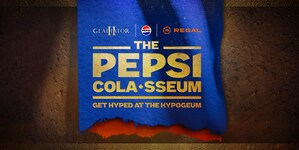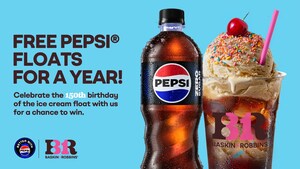PepsiCo Exceeds Global Water Stewardship Goals
Company reduced operational water use by 26 percent
Water conservation efforts delivered more than $80 million in cost savings in five years
PepsiCo Foundation partnerships have now provided 9 million people access to safe water
PURCHASE, N.Y., Aug. 29, 2016 /PRNewswire/ -- PepsiCo, Inc. [NYSE: PEP] today announced continued progress against the company's strategy to help protect and conserve global water supplies and provide people access to clean, safe water to communities around the world.
In 2015, PepsiCo reduced its operational water use per unit of production by 26 percent versus a 2006 baseline. This exceeded the company's previously stated goal to reduce operational water use by 20 percent by the end of 2015.
PepsiCo's water conservation efforts saved the company more than $80 million between 2011-2015. This is part of PepsiCo's broader environmental sustainability agenda, which has delivered more than $600 million in cost savings over the past five years through the continued progress of the company's water, energy, packaging and waste-reduction initiatives.
PepsiCo also continues to expand its efforts to provide access to safe water in water-stressed communities around the world. Through the PepsiCo Foundation, the company has partnered with leading non-profit organizations to now reach 9 million people with safe water access since 2006, far exceeding its original goal of 6 million by the end of 2015.
"Access to safe water is an essential building block for improved social, economic and health conditions in communities around the world," said Dr. Mehmood Khan, PepsiCo Vice Chairman and Chief Scientific Officer, Global Research and Development. "Companies have an important role to play in solving global water challenges, and we must continuously seek new ways to apply our unique capabilities and expertise to conserve this most precious resource.
"All across PepsiCo, we continue to find innovative new ways to grow our business while using fewer natural resources—water among them," Khan continued. "By driving down our operational water use and replenishing water within the local watershed, promoting innovative agricultural practices that yield more crop per drop, and enabling access to safe water and sanitation for millions of people, we have achieved important progress and are committed to doing much more in the years ahead."
PepsiCo has a comprehensive and ambitious global water stewardship strategy. The company's progress to date includes:
-- Reducing absolute water usage in its operations by approximately 3.2 billion liters in 2015, while still growing its beverage and snacks manufacturing volume. In Jordan, PepsiCo's business has cut water usage by more than 40 percent per unit of production since 2006.
-- Launching the Sustainable Farming Initiative in 2013 to help growers operate more efficiently and meet PepsiCo's social, economic and environmental standards—including the development of effective water management plans to preserve local water quality. Today, the Sustainable Farming Initiative has expanded to growers across 15 countries, with active programs representing over 28,000 growers in its supply chain.
-- Developing and deploying a direct seeding machine for rice farmers in India, enabling participating growers to save more than 10 billion liters of water since 2013.
The PepsiCo Foundation has made access to safe water one of its cornerstone grant-making priorities. Examples of PepsiCo and the PepsiCo Foundation's water-related partnerships include:
-- Partnering with the Inter-American Development Bank (IDB) since 2008 to reach underserved communities across Latin American and the Caribbean with water solutions. In 2016, PepsiCo and the PepsiCo Foundation announced a five-year renewal of the partnership, which will start off with "From Source to Home," a program focused on water and sanitation that will use a U.S. $5 million dollar grant from the PepsiCo Foundation to work to improve the lives of approximately 850,000 people by 2025.
-- Supporting the Safe Water Network (SWN) in establishing iJal small water enterprises in India that currently provide self-sustaining safe water access stations to over 600,000 people. Next month, SWN will launch its 150th iJal station, reaching the half-way point of its goal to establish 300 iJal stations across India.
-- Contributing to Recycle for Nature, a five-year partnership between PepsiCo and The Nature Conservancy that aims to protect U.S. drinking water sources by recycling beverage bottles and cans. The program recently added the American River Headwaters to the initiative. By contributing to the American River project, which will take place over a three-year period, Recycle for Nature can work to reduce the risk of catastrophic wildfires on more than 10,000 acres of forest, safeguard water quality and advance research on the link between healthier watershed conditions and water supply.
PepsiCo's global water efforts are part of the company's broader commitment to Performance with Purpose, a fundamental belief that business success is inextricably linked to the sustainability of the world around us. For nearly 10 years, PepsiCo has committed to growing its business in ways that meet the changing expectations of consumers and help solve complex challenges facing society. By offering healthier products, using fewer natural resources and investing in communities, PepsiCo if focused on creating conditions that enable both business and society to thrive.
To learn more about Performance with Purpose and download PepsiCo's Sustainability Report, please visit www.howwillwe.com.
About PepsiCo
PepsiCo products are enjoyed by consumers one billion times a day in more than 200 countries and territories around the world. PepsiCo generated more than $63 billion in net revenue in 2015, driven by a complementary food and beverage portfolio that includes Frito-Lay, Gatorade, Pepsi-Cola, Quaker and Tropicana. PepsiCo's product portfolio includes a wide range of enjoyable foods and beverages, including 22 brands that generate more than $1 billion each in estimated annual retail sales.
At the heart of PepsiCo is Performance with Purpose – our goal to deliver top-tier financial performance while creating sustainable growth and shareholder value. In practice, Performance with Purpose means providing a wide range of foods and beverages from treats to healthy eats; finding innovative ways to minimize our impact on the environment and reduce our operating costs; providing a safe and inclusive workplace for our employees globally; and respecting, supporting and investing in the local communities where we operate. For more information, visit www.pepsico.com.
Cautionary Statement
Statements in this communication that are "forward-looking statements" are based on currently available information, operating plans and projections about future events and trends. Terminology such as "aim," "anticipate," "believe," "drive," "estimate," "expect," "expressed confidence," "forecast," "future," "goal," "guidance," "intend," "may," "objective," "outlook," "plan," "position," "potential," "project," "seek," "should," "strategy," "target," "will" or similar statements or variations of such terms are intended to identify forward-looking statements, although not all forward-looking statements contain such terms. Forward-looking statements inherently involve risks and uncertainties that could cause actual results to differ materially from those predicted in such forward-looking statements. Such risks and uncertainties include, but are not limited to: changes in demand for PepsiCo's products, as a result of changes in consumer preferences or otherwise; changes in, or failure to comply with, applicable laws and regulations; imposition of new or increased taxes, disagreements with tax authorities or additional tax liabilities; PepsiCo's ability to compete effectively; PepsiCo's ability to grow its business in developing and emerging markets or unstable political conditions, civil unrest or other developments and risks in the markets where PepsiCo's products are made, manufactured, distributed or sold; unfavorable economic conditions in the countries in which PepsiCo operates; increased costs, disruption of supply or shortages of raw materials and other supplies; failure to realize anticipated benefits from PepsiCo's productivity initiatives or global operating model; business disruptions; product contamination or tampering or issues or concerns with respect to product quality, safety and integrity; damage to PepsiCo's reputation or brand image; failure to successfully complete or integrate acquisitions and joint ventures into PepsiCo's existing operations or to complete or manage divestitures or refranchisings; changes in estimates and underlying assumptions regarding future performance that could result in an impairment charge; PepsiCo's ability to recruit, hire or retain key employees or a highly skilled and diverse workforce; loss of any key customer or changes to the retail landscape; any downgrade or potential downgrade of PepsiCo's credit ratings; the ability to protect information systems against, or effectively respond to, cyber attacks or other cyber incidents or other disruption; PepsiCo's ability to implement shared services or utilize information technology systems and networks effectively; fluctuations or other changes in exchange rates; potential impacts of climate change or water scarcity, or legal, regulatory or market measures to address climate change or water scarcity; failure to successfully negotiate collective bargaining agreements, or strikes or work stoppages; infringement of intellectual property rights; potential liabilities and costs from litigation or legal proceedings; and other factors that may adversely affect the price of PepsiCo's common stock and financial performance.
For additional information on these and other factors that could cause PepsiCo's actual results to materially differ from those set forth herein, please see PepsiCo's filings with the Securities and Exchange Commission, including its most recent annual report on Form 10-K and subsequent reports on Forms 10-Q and 8-K. Investors are cautioned not to place undue reliance on any such forward-looking statements, which speak only as of the date they are made. PepsiCo undertakes no obligation to update any forward-looking statements, whether as a result of new information, future events or otherwise.
Logo - http://photos.prnewswire.com/prnh/20140415/73233
SOURCE PepsiCo
Related Links
WANT YOUR COMPANY'S NEWS FEATURED ON PRNEWSWIRE.COM?
Newsrooms &
Influencers
Digital Media
Outlets
Journalists
Opted In






Share this article